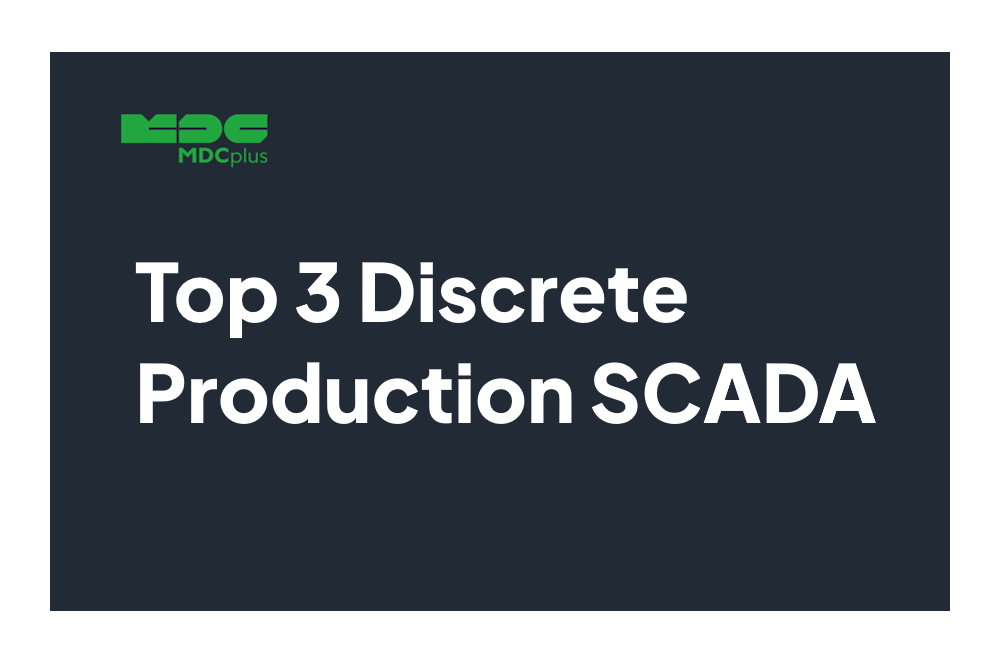Top 3 SCADA Systems For Discrete Manufacturing
Comparison of SCADA Systems for Discrete Manufacturing
Here's a detailed breakdown of the key differences, integration capabilities, pros, and cons of three leading SCADA systems tailored for discrete manufacturing:
Wonderware InTouch (AVEVA)
Integration Information:
- Seamlessly integrates with AVEVA System Platform for enterprise-wide visibility.
- Strong compatibility with Manufacturing Execution Systems (MES).
- Supports third-party devices via OPC UA and other standard protocols.

Pros:
- User-friendly interface with drag-and-drop HMI design.
- Comprehensive support for real-time data visualization.
- Pre-built templates accelerate development for specific industries.
- Active community and extensive training resources.
Cons:
- Licensing can be expensive for smaller operations.
- May require additional software (e.g., AVEVA System Platform) for advanced functionality.
- Limited flexibility compared to open-source or modular platforms.
Siemens WinCC

Integration Information:
- Fully integrated with Siemens automation ecosystem, particularly Siemens PLCs.
- Offers native integration with TIA (Totally Integrated Automation) Portal.
- Can communicate with non-Siemens systems via OPC UA and standard protocols.

Pros:
- Optimized for high-speed and precise automation, such as automotive assembly lines.
- Extensive library of pre-configured templates and reusable objects.
- Strong cybersecurity features.
- Reliable for large-scale manufacturing environments.
Cons:
- Primarily designed for Siemens hardware, limiting flexibility with third-party equipment.
- Steeper learning curve for non-Siemens users.
- Higher upfront costs for licensing and hardware.
Ignition by Inductive Automation

Integration Information:
- Modular and device-agnostic, supporting integration with various PLCs, MES, and IoT platforms.
- Strong support for modern protocols, including MQTT and OPC UA.
- Cloud and edge connectivity for distributed environments.

Pros:
- Scalable for both small and large operations.
- Unlimited licensing model, reducing costs for expansive implementations.
- Strong IoT and analytics capabilities with built-in web-based HMI.
- Cross-platform compatibility (Windows, Linux, and macOS).
Cons:
- Requires technical expertise for initial setup and customization.
- May lack the industry-specific templates that competitors like Wonderware or Siemens offer.
- Smaller support network compared to legacy platforms.
|
Feature/Metric |
|||
|
Integration |
Strong with MES, third-party devices |
Best with Siemens ecosystem, TIA Portal |
Modular; supports IoT, MES, diverse PLCs |
|
Ease of Use |
Highly intuitive HMI design tools |
Steeper learning curve |
Requires initial expertise |
|
Best For |
Real-time data visualization, mid-scale |
High-speed production lines |
Scalable projects, IoT-enabled systems |
|
Licensing Cost |
Higher costs for advanced features |
High upfront costs |
Cost-effective unlimited licensing |
|
Customization |
Limited compared to open systems |
Tied to Siemens hardware |
Highly customizable |
|
IoT Compatibility |
Moderate |
Limited |
Excellent |
To sum up, Wonderware InTouch (AVEVA) is ideal for manufacturers needing an intuitive interface and robust MES integration, particularly for mid-sized operations. Siemens WinCC suits companies already invested in Siemens hardware or requiring precise, high-speed automation. Ignition excels in scalability and flexibility, making it perfect for diverse production environments and those seeking IoT integration. The decision should be guided by your operational scale, current infrastructure, and preference for vendor-specific ecosystems or adaptable solutions.
About MDCplus
Our key features are real-time machine monitoring for swift issue resolution, power consumption tracking to promote sustainability, computerized maintenance management to reduce downtime, and vibration diagnostics for predictive maintenance. MDCplus's solutions are tailored for diverse industries, including aerospace, automotive, precision machining, and heavy industry. By delivering actionable insights and fostering seamless integration, We empower manufacturers to boost Overall Equipment Effectiveness (OEE), reduce operational costs, and achieve sustainable growth along with future planning.
Ready to increase your OEE, get clearer vision of your shop floor, and predict sustainably?
Other articles
While both involve structured review and analysis, their objectives, scope, and outcomes differ significantly. This article exploring this topic further.
